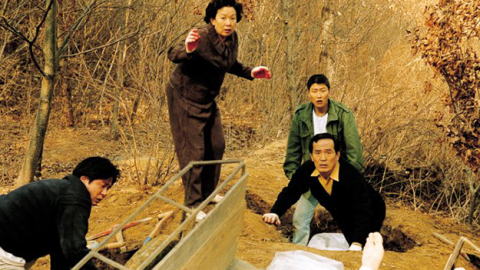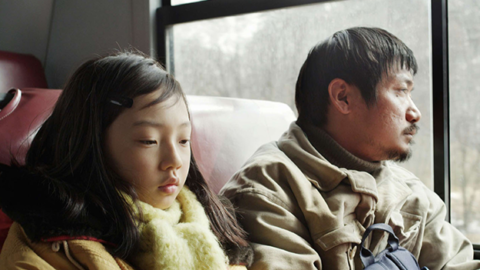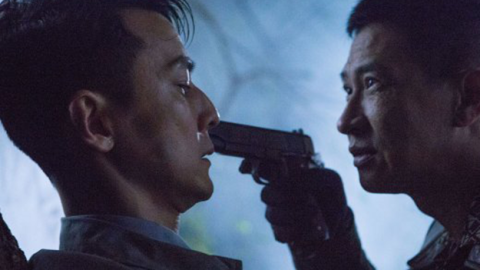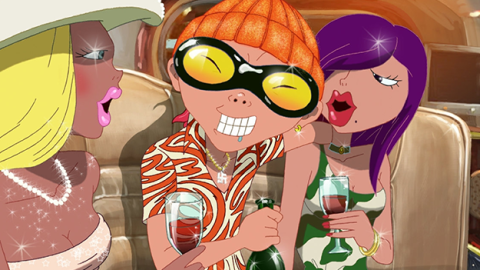Kaiju Shakedown: Assassination
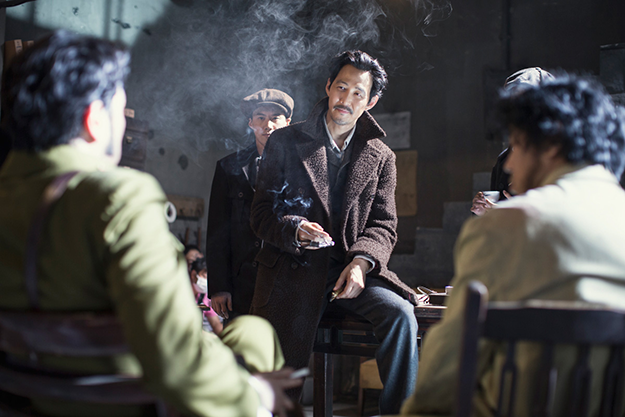
Assassination
In 2014, it suddenly became hip to be square in Korea. It’s the year that the cloyingly sentimental, uber-patriotic, and decades-spanning Ode to My Father became the second-highest-grossing movie of all time in Korea. Not the second-highest-grossing Korean movie. The second-highest-grossing movie. Why wasn’t it number one? That spot went to another uber-patriotic 2014 release, The Admiral: Roaring Currents, the hagiographic, inspirational, somewhat real-life story of a 16th-century Korean admiral who scored a naval victory against the nefarious Japanese.
The Japanese have been the bad guys in Korean (and Chinese, and Taiwanese, and Indonesian) cinema since those countries threw off their colonial yokes after World War II, but killing Japanese people on film has experienced a huge resurgence in recent years. Aside from the fact that they’re comparable to Nazis in American movies, it’s also because Mainland China is such a huge market for everyone that it’s safer to make the bad guys in your movie sadistic Japanese soldiers—contemporary baddies might run afoul of PRC censorship. Nevertheless, it’s starting to become a bit disturbing to see one screaming Japanese actor after another take head squibs on film. Some Japanese actors have even moved to China and made careers playing “Japanese devils.”
Faced with a sworn enemy directly over its northern border, Korea has turned out movies about facing down foreign invaders all the way back to Patriotic Martyr An Jung-Gun (72) and before. But it was around 2010 with movies like 71: Into the Fire (10), My Way (11) and War of the Arrows (11), that these films started scoring big at the box office again, so it was only a matter of time before director Choi Dong-Hoon hopped on board the “Blast a Jap” train. His contribution to the genre is Assassination, which was released on July 22, immediately set several opening-day records, and is now playing movie theaters around the world, including North America.
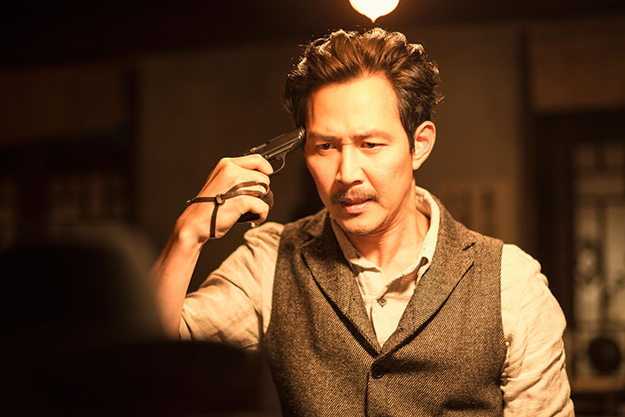
Assassination
Ever since his first movie, The Big Swindle (04), Choi has shown up at the Korean box office every two or three years with a heist or a caper movie starring a sprawling cast of players plucked from his stable of regulars, and every single one of them has become a huge hit. His last movie was The Thieves (12), a movie that, on the surface, looked like a remake of Ocean’s 11, featured an international cast, ran two-and-a-half hours, and became the second-highest-grossing movie in Korean film history (at the time). Assassination is primed to replicate that success. In its third week, it’s already the second-highest-grossing movie of the year with over eight million tickets sold, putting it only two million tickets behind Avengers 2: Electric Boogaloo, which currently occupies the number one slot.
On the surface, this is yet another anti-Japanese, nationalistic Korean movie. Set in 1933, the Korean government in exile gives one of its top undercover operatives, Agent Yem (Lee Jung-Jae), a mission: recruit three people to infiltrate occupied Seoul and assassinate the governor of the Japanese garrison along with a wealthy Korean collaborator. He selects steely-eyed female sniper An (Jeon Ji-Hyeon), a mustachioed brawler named Big Gun (Jo Jin-Ung), and a dopey explosives expert (Choi Deok-Mun). But Agent Yem is a double-agent for the Japanese and he hires a hit man named Hawaii Pistol (the ultra-cool Ha Jung-Woo), and his sidekick (Oh Dal-Su) to put bullets in his team’s heads.
Choi is one of the best directors of blockbuster entertainment working right now. His movies are beautifully made, precision-tooled entertainments. His shooting style doesn’t call attention to itself because all his energy is devoted to the story and characters. With a cinematic sleight-of-hand, he takes characters off the table, letting you forget about them, and then drops them back into the action at an opportune moment. He loves establishing a seemingly inconsequential detail early on that, out of nowhere, becomes the engine for the latter half of the story. His editing aims for nothing more or less than total clarity of action. Assassination contains several action setpieces that are refreshingly free of shaky-cam. No matter how many cars are flipping or grenades are exploding, the viewer is never confused about who’s where and what’s happening. When Choi unleashes a massive action spectacle late in the film he makes sure that we’ve already visited its department store setting several times so viewers are familiar enough with its layout that he can barrel full speed ahead. But what elevates Choi’s filmmaking is its Korean-ness, and that turns out to be what makes Assassination exceptional.
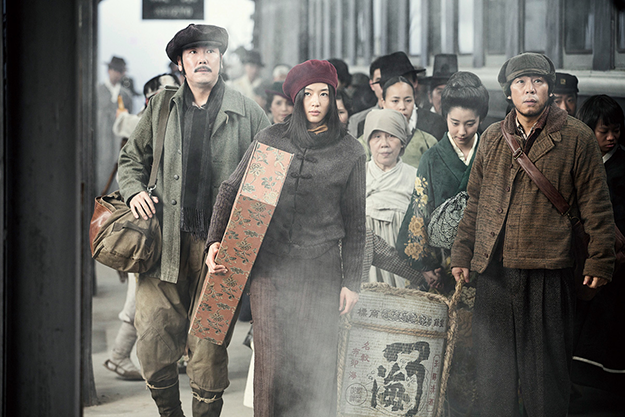
Assassination
Korea’s national genre is the melodrama. Over 50 percent of the production slate during Korea’s Golden Age of Cinema (1953–73) were melodramas and many of the now-classic movies of the Korean film renaissance of the late Nineties are riffs on the form (Christmas in August, 98; The Quiet Family, 98; Happy End, 99). Shiri (99) was the first of the new wave of Korean blockbusters and while it ostensibly revolved around a North Korean plot to infiltrate South Korea, it actually centered on the relationship between a secret agent and his fiancée. Choi’s The Thieves follows the Ocean’s 11 blueprint faithfully until the one-hour mark when the casino heist falls apart in spectacular fashion and the last 90 minutes are devoted to sorting out the complicated relationships, love affairs, back stories, betrayals, and loyalties of its 10-person cast, becoming, in essence, a melodrama wrapped inside an action movie.
When it starts, Assassination feels deceptively simple, because Choi is subtly working a clever reversal that he springs on the audience during the central setpiece, an assassination attempt on the Japanese governor. What looked like a movie about secret agents and national agendas radically switches gears in one 15-minute scene, and instead becomes about a scarf exchanged during a flirtatious moment, the accidental meeting of two potential lovers, twins separated at birth, a bad dad, and a man atoning for his past crimes.
While Assassination involves far more tommy guns and stabbings than your average Korean meller, the fact is that everything in the second half of the movie springs from the characters, their childhoods, their relationship with their parents, and how those factors influence, warp, twist, and inspire their present lives. There’s a wedding, a scene of sneaking around a house in the middle of the night, and even a romantic kiss. Choi’s story is driven by his characters and they, in turn, are driven by their pasts.
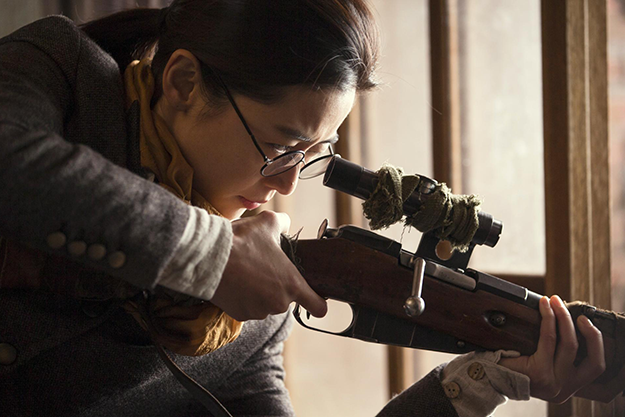
Assassination
There are flaws aplenty. A clumsy and heavy-handed framing device set during the postwar Anti-National Crimes Special Committee distracts more than it illuminates, and the Japanese characters are cut from the same “Japanese devils” cloth as they are in so many other Asian films. But while some complain that the movie goes on for too long, that’s like complaining that your sushi is undercooked. The day a Korean director turns in a 90-minute movie will be a cold day in Hell.
A more complicated complaint made by critics calls the characters shallow, saying that they guard their emotions too tightly to feel much sympathy for them. That’s simply a misreading of the genre. The default mode in melodrama is to let your characters wail and scream, to make passionate speeches with tears running down their faces, to rend their clothes. Choi has made a conscious choice to focus on characters that can’t afford to give in to their emotions. Ha Jung-Woo plays a hit man whose pose as a cold-blooded killer is over-compensation for a past act of cowardice, and by its very definition subdued and emotionless, as he’s required to be during his frequent impersonations of a Japanese naval officer. The star of the film, Jeon Ji-Hyeon, rocketed to fame as a brash, smack-talking girlfriend in My Sassy Girl (01) and enjoyed a renaissance when she played a flirty cat burglar in Choi’s The Thieves. Here, she’s everything those performances were not: quiet, guarded, nerdy, focused, and intense. Jeon’s cold-blooded An slips between identities as casually as she works the bolt of her rifle, acting Chinese, Japanese, butch, or femme whenever it’s required. Constantly pretending to be someone else, she can never lower her guard, and must always be thinking in order to stay one step ahead of her pursuers. But all this playacting is her way of distracting herself from the fact that she has no idea of who she really is—she has no roots, no country, no home, and no family. All she can do is kill.
Having experienced a lifetime of deprivation during her exile in China where she served in the Army, An only drops her guard when she experiences unexpected pleasures, such as her first taste of coffee or a lead-footed introduction to a popular dance. She’s the heart of this movie, a character that has to pretend to be someone she’s not in order to survive. The film’s concerns are the concerns of melodrama, and the concerns of melodrama are the tragedy that lies in the gap between the way a woman’s life is and the way it should be. An is tough by necessity, but Choi finds a way to present us with an alternate reality where she was able to have a life full of small, sensual, everyday pleasures. It’s no accident that the final shot of this big, loud, bullet-riddled, explosion-laden blockbuster about Korea is a simple shot of An watching the other characters cut loose and dance. She’s standing on the sidelines, surprised to find herself smiling, unable to join in, her breathing and her heartbeat the last things we hear as the movie fades to black.
LINKS! LINKS! LINKS!
… Other countries in Asia may hate Japan, but only North Korea hates Japan so much that they’re going back in time. Last week, they issued a press release establishing a new time zone because currently it shares a time zone with Japan and that’s unacceptable! Because Japan is the devil! After August 15, North Korea will be 30 minutes behind because “The wicked Japanese imperialists committed such unpardonable crimes as depriving Korea of even its standard time.” No response yet from Japan, but hopefully there will be a movie soon from North Korea about the heroic scientists who changed time itself to combat Japanese aggression and imperialism.
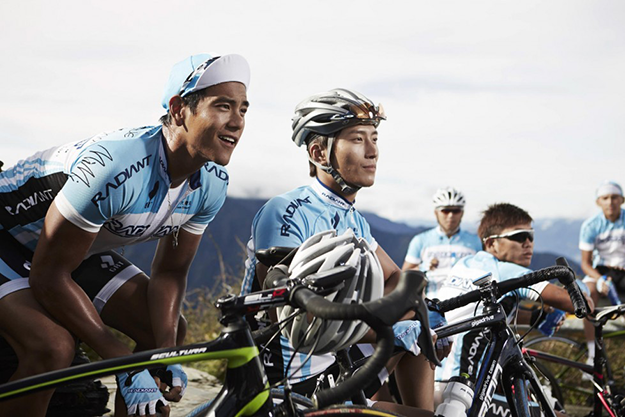
To the Fore
… Assassination is just one of many Asian movies getting day and date (or close to it) releases in the United States right now. AMC Theaters are the home for a lot of these with Chinese, Korean, and Indian movies hitting their screens across the country, and right now, among a bunch of titles, they’re also screening To the Fore, the hotly anticipated bike-racing movie from Hong Kong’s action maestro, Dante Lam. Read a review here.
… China Lion, the company that has been distributing Chinese movies in the United States day and date via AMC, is running trailers for Johnnie To’s musical, Office, starring Chow Yun-fat and Sylvia Chang, based on Chang’s hit stage musical. There’s no date announced, but the movie plays the Toronto International Film Festival in September and is being released in Hong Kong in late September, so expect something around then.
… It’s been four years in the making, but Juthamas Siriwan, former president of the Bangkok International Film Festival, has finally been indicted for embezzling money. It took a long time, but now that Gerald and Patricia Green, the people who received her bribes, have been successfully prosecuted in the United States, the Thai government is going after Siriwan.
… Sex is scary. Very, very scary. India is ranked one of the world’s largest consumers of Internet porn, but last week the Indian Telecommunications Ministry banned 850 porn sites. This quickly became a source of much mockery, especially after folks at the Center for Internet and Society published the heretofore-secret list of all 850 sites being blocked. So last Wednesday, the government lifted the ban and restored the sites so that all Indians may enjoy all the fruits of a free, open, and democratic society. Like boobs.
… But boobs are dangerous! In Hong Kong, Ng Lai-ying was at an anti-Mainlander protest when Chief Inspector Chan reached out to grab her bag during a scuffle and grabbed her breast instead. She accused him of indecent assault. He accused her of using her breast to assault him. She was found guilty of assault with a deadly breast and a protest popped up outside Wan Chai police headquarters featuring lots of Chinese men wearing bras and saying things like, “The way I dress today looks quite ugly as a male, but it is not as ugly as the judgment, which is like pointing at a deer and calling it a horse.” Exactly! A horse with boobs.
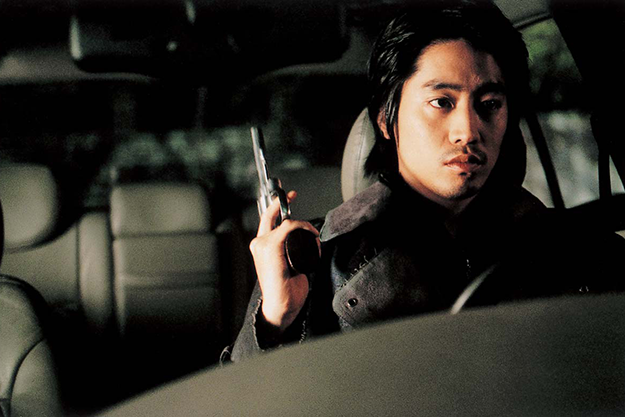
A Bittersweet Life
… Kim Jee-Woon of A Bittersweet Life (05) and I Saw the Devil (10) is now the director of the first Warner Brothers-produced and distributed Korean film. Called Secret Agent and starring Song Kang-Ho (The Host, Snowpiercer), it’s set—sigh—during the colonial period when Japan occupied Korea. Also of interest in the article is the tidbit that Kim is credited as screenwriter on the New Regency Pictures remake of his A Bittersweet Life, a remake deal that has kept the original film off the home video market even though it’s considered one of Kim’s most accomplished movies.
… Sakura Ando, one of the stars of Sion Sono’s Love Exposure, belongs to a family of filmmaking Andos, including her sister, writer-director Momoko Ando; her dad, director-actor Eiji Okuda; and her mom, actress-producer Kazu Ando. Sakura is having a moment right now after her starring role in 100 Yen Love, a female boxing movie, and she gives an interview about her work here. She also appears alongside her mom and dad in her sister’s latest movie 0.5mm, which is getting rave reviews.
… Masato Harada, the Howard Hawks of Japan, is the man behind movies like Bounce Ko Gals (97), Choice of Hercules (02), and Climber’s High (08), but now he’s putting Emperor Hirohito on film in The Emperor in August, a movie about the last days of World War II and Japan’s decision to surrender. In Choice of Hercules, Harada turned a banking scandal into an edge-of-your seat thriller, and in Climber’s High he made the maneuvering of the press around the crash of JAL 123 a big-budget blockbuster. Now he’s making Japan’s surrender the centerpiece of his latest film, and hoping to avoid being murdered by right-wingers who object to any depiction of the Emperor, or of Japan’s surrender, just on principle. To that end, he couldn’t touch the fraught relationship between Hirohito and his mother but it sounds juicy. “She wanted to fight to the end, so Hirohito had a hard time with her,” Harada says in the interview. “That would make an interesting film for the future.”
… Adam Torel runs Third Window films, an Asian distribution company in the U.K. He’s a good guy, and he writes a great essay over on Wildgrounds about his experience at Cannes this year, finally pointing out that Cannes is full of crap when it comes to Asian movies:
“The same four Japanese directors make it into competition every year (Kawase/Miike/Kore-eda/Kurosawa) and all are handled by French sales companies . . . Everybody knows about this. All buyers/sellers know it, it’s not a secret at all. If it’s a French or European big sales agency: Fortissimo, Wild Bunch, Celluloid Dreams, MK2, etc. then they get into the festival.”
There’s more frank discussion here.
![]()
The Last Dragon
… The Last Dragon is coming to Blu-ray. Executive produced by Motown’s Berry Gordy, this 1985 martial-arts musical freak-out starring Taimak and Vanity with Willie Hutch and Stevie Wonder on the soundtrack is finally getting a massive special edition Blu-ray on August 25. The movie is a trip. [https://youtu.be/65f2sO6WmdQ] So the Blu-ray is going to be enormous!



